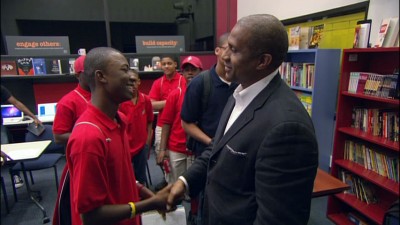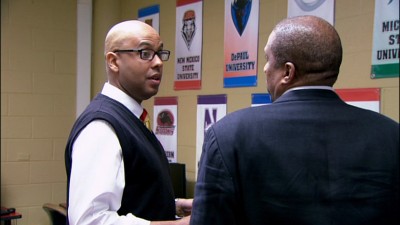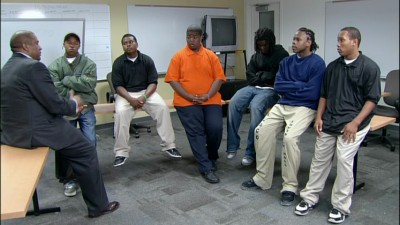| Reviews & Columns |
|
Reviews DVD TV on DVD Blu-ray 4K UHD International DVDs In Theaters Reviews by Studio Video Games Features Collector Series DVDs Easter Egg Database Interviews DVD Talk Radio Feature Articles Columns Anime Talk DVD Savant Horror DVDs The M.O.D. Squad Art House HD Talk Silent DVD
|
DVD Talk Forum |
|
|
| Resources |
|
DVD Price Search Customer Service #'s RCE Info Links |
|
Columns
|
|
|
Tavis Smiley Reports: Too Important to Fail

The title itself draws a line in the sand: Too Important to Fail is a variation on and rebuke to the banking industry's "too big to fail" bailout demand that surely still rings in all our ears, making us see red when we think about where our country's priorities are and what's "important" as measured by how many billions of dollars our government feels obliged to direct towards it. What the title of this Tavis Smiley investigative report refers to as important is, conversely, something that seems always to have to scrimp and beg for funding scraps: the U.S.'s perpetually-in-crisis public educational system. It's the particular failure of that system to do right by African-American boys and young men that Smiley--a journalist and social activist who addresses many issues but is among the foremost documenters of the black experience in America today--is focusing on here, and for those of us who, by dint of our privilege and luck, have escaped being failed so miserably, it's an eye-opening, sobering, galvanizing look at a problem whose urgency may not be felt directly by those with the most power, but is one that affects us all.

Smiley visits primarily African-American neighborhoods and schools in Philadelphia, Chicago, Oakland, and Los Angeles to look at a situation that's critical but retains some room for hope; he doesn't shy away from the dispiriting, shameful facts, but the point is to see what can be done to address the crisis, and indeed what the community is already doing to make innovations and insist on success for its "at risk" young men. After informing us that the dropout rate of African-American males is 48%, and that over 20% of black American children are placed in special education, Smiley sits down with educational leaders--including, among others, Dr. Alfred Tatum of the University of Chicago, who runs a literacy program for high school-age students; Arlene Akerman, former superintendent of the Philadelphia School District; and Tim King, CEO of the innovative Urban Prep schools--to get their thoughts on the particular needs of this demographic group with such statistically dismal educational prospects. Despite their own successes in the embattled arena of getting young black males engaged with education and set onto the path to accomplishment and self-realization, these interviewees are not naive about the vicious cycle they're fighting against, in which the fact that young black males are at risk is just the nadir of a whole ball of economic injustice, racism in the correctional establishment, and lack of visible indicators--strong, successful black male role models--that would suggest it might be worth having the extra discipline and persistence it takes to overcome the traumas of violence, poverty, and racism (all experienced to a paralyzing degree by an appallingly large number of young black men) and work hard in what even then might be a chaotic and overcrowded classroom where one may not get nearly the attention or culturally most effective curriculum one needs to succeed. These first-hand expert witnesses offer both pragmatic, implementable options for fighting back against this ingrained, institutional bias and warnings that if their effective approaches are drowned in a sea of underfunding and superficial obsessions with test scores, black males will continue to fail at an unjustifiable and unforgivable (because absolutely unnecessary) rate.

The concerned, involved educational trailblazers that Smiley interviews offer an overview that in itself gives us plenty of hard-won knowledge and perceptiveness. For example, King's observation that offering young African-American students not just one but many different kinds of successful black male role models is key to their feelings of choice and empowerment in their future is both head-smackingly obvious, yet very rarely the reality in a field where only 1% of educators are male and black (not to mention in a world where monolithic, reductive images of what one can be if one is a black man are too often the norm, whether one is talking about positive or negative role models). But Smiley also goes deeper into the heart of the matter, presenting conversations with the kids that are the raison d'être of the whole discussion in the first place: high-school age black males who are endeavoring for success with the too-rare opportunities afforded by those programs and schools dedicated to their individual advancement, as well as those young black adults who are faced with the arguably tougher challenge (after having fallen in with the crime and negativity that comes with the economic stagnation African-Americans have faced disproportionately in the U.S. throughout its history) of reforming and committing themselves to an education whose worth is only now, when it may be too late, becoming apparent to them.

You could aesthetically fault the program for its conventional-news-program montage and music, with cheesy faux-hip-hop and soft-rock balladry mixed in with some heavy-handed slo-mo uplift--manipulations that, it should be noted, risk trivializing serious subject matter and all too often do at every level of our televisual culture--but aesthetics are frankly secondary to the importance of the voices, much too seldom heard from, to which Smiley is lending an ear, and the urgency of what they're telling us comes through loud and clear. The overfamiliar formal conventions that the show plays along with cannot suppress Smiley's typical commitment to open-mindedness, listening, and understanding--his refusal to boil the issue down to a black-and-white, with-us-or-against-us binary, offering us a more expansive and substantial look at the crisis than a screed or simplistic prescription.
Smiley structures Too Important to Fail's multifaceted, troubling conversation about race, education, and opportunity in America as both a convincing statement and a provocative question posed to the viewer. The statement is that the failure of public education is a demonstrable fact we cannot ignore, and the "No Child Left Behind"-type solutions that have often been imposed by those too high up to see the nitty-gritty of the classroom experience are no real solution. Our understanding, awareness, and dedication across the board--our refusal to let one group of children be victimized by circumstances they didn't create, whether we belong to the same group or not--is crucial to allowing those who are working long and hard to find real solutions to make a change. And Smiley's question for us is, do we have the dedication, sense of justice and fair play, and real, effort-demanding national pride to give those solutions the resources and the chances they need to effect a change in a system under whose brokenness African-American male students have unfairly suffered in disproportionate numbers for far too long? He leaves the question open, but Too Important to Fail does a fine job of posing it clearly and powerfully enough that it precludes the possibility of considering it just a vague, too-easily ignorable public-policy issue among many, pushing it instead to the forefront of our minds as a matter of conscience, respect, and dedication to the real American way.

THE DVD:
The transfer (1.78:1 anamorphic widescreen) is standard-definition digital video from a standard-definition broadcast, which means that it's visually nice enough, but definitely with a rough-and-ready, shot-on-the-ground documentary quality that's usually been smoothed out in dramatic commercial programming. That's of little importance, though; this is no more or less than the look of news programming across the board, that familiar visual quality translates with no loss of quality to the DVD format (no compression artifacts or other flaws in the authoring), it lets us see what we need to see clearly enough, and it certainly doesn't stand in the way of the program's hands-on, pragmatic goals of informativeness, enlightenment, and challenge.
Sound:The Dolby Digital 2.0 soundtrack offers a fairly rich, expansive sound that is clear at all times. Though not especially fancy, it's at the high end of the quality spectrum in the context of TV news/information broadcasts and has no flaws or deficiencies to speak of.
Extras:None.
FINAL THOUGHTS:It sometimes has the ho-hum look and feel of a conventional TV-news documentary (it isn't Hoop Dreams), but Tavis Smiley Reports: Too Important to Fail has subject matter and content that's too powerful to ignore, regardless of any conventionality in its presentation, and Smiley's excellence as an interviewer, speaker, and facilitator of a vital conversation about the alarming failure of young African-American males by our education system needs no special visual finesse or innovation. The simple, demonstrable facts are there, presented to us plainly and engagingly through the lens of Smiley's straight-talking observation and questioning, and bulwarked with a rich undercurrent of testimony by those who are out there living those facts every day. It's a window into a facet of the American experience that we all have (or should have) an investment in, and any citizen who concerns him or herself with what we owe ourselves as a society and a nation should take a look to see just where the problem(s) lie and, most importantly, that there is something to be done if we can acknowledge the crisis and roll up our sleeves. Recommended.
|
| Popular Reviews |
| Sponsored Links |
|
|
| Sponsored Links |
|
|
| Release List | Reviews | Shop | Newsletter | Forum | DVD Giveaways | Blu-Ray | Advertise |
|
Copyright 2024 DVDTalk.com All Rights Reserved. Legal Info, Privacy Policy, Terms of Use,
Manage Preferences,
Your Privacy Choices | |||||||














